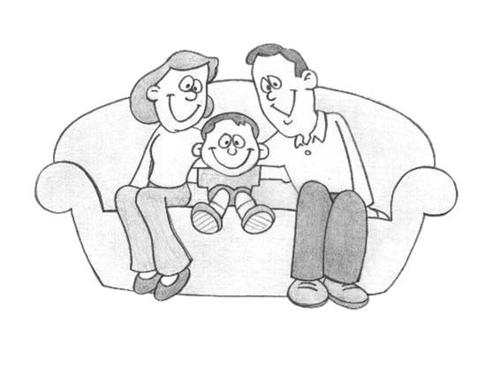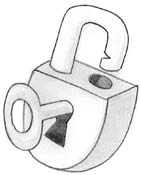The 1-2-3 Magic Workbook for Christian Parents: Effective Discipline for Children 2-12 (33 page)
Read The 1-2-3 Magic Workbook for Christian Parents: Effective Discipline for Children 2-12 Online
Authors: Thomas W. Phelan,Chris Webb
Tags: #Family & Relationships, #Parenting, #General


186 1-2-3 MAGIC
unnecessary parental interventions: the undermining of the child’s con-
fidence. If you grow up constantly hearing your parent’s thoughts about
how you can’t handle this and you can’t handle that, you’re not going to
have a very high opinion of your own abilities. “Now don’t get too loud
at the party and be sure to take turns and remember to thank Mrs. Johnson
and be nice to the other children and...” The message as received: “You’re
a social imbecile.”
Overparenting is the opposite of one of a parent’s most fundamental
jobs: fostering self-esteem by encouraging independence and autonomy.
As they get older, kids must learn to handle more and more on their own.
After all, a main goal of most parents is not to have their children living
at home for the rest of their lives.
So next time you get the urge to warn or discipline—or even count—
a child, ask yourself a few questions. Can my daughter handle this
situation on her own? Would it be better in this case for her to learn by
direct experience? Is the issue important enough for me to get involved?
Sometimes it’s better to keep quiet, cross your fingers, do your best
to relax and watch your child learn and mature. Consider the exercise an
investment in both your child’s self-esteem and in her future.
Points to Remember...
One of your most important tasks as a parent is to foster and
encourage your child’s growing independence. If you happen to be
an unnecessary worrier, think about how many of your worries you
should keep to yourself.

23
Affection and Praise
Give some thought to the reputation your child has—with you.
We put affection and praise in the same chapter because the two are
so similar. In a sense, affection is the “I like you” part of parent-
ing. Affection is a self-esteem builder for kids because it represents a
direct confirmation of the young person and it contributes to the social-
competence part of the self-esteem equation. Praise is the “I like—or
I am proud of—what you are doing” part of parenting. Praise is also
a self-esteem builder because it recognizes and reinforces competent
behavior in a child.
When it comes to affection and praise, however, parents have a
harder job than you might expect. While affection and praise are obvious
self-esteem boosts to children as well as great relationship strengtheners,
we parents usually do not engage in these types of behavior nearly as
often as we should. We mentioned one reason for this deficit in Chapter
13: the “Angry Parents Speak, Happy Ones Keep Quiet” rule. This “rule”
refers to the tendency of adults to give feedback to children when the
adults are angry, but to keep quiet when the adults are happy with the
youngsters’ behavior.
Our inherent biological perversity—the fact that we speak more
187

188 1-2-3 MAGIC
when angry and don’t praise or act affectionately unless we really, really
feel like it—is one of the big reasons why we asked you first to learn
how to control kids’
obnoxious
behavior in parenting Step 1, and later
to learn how to encourage kids’
positive
behavior in parenting Step 2.
Success at Steps 1 and 2 will make you more inclined to consistently
apply the relationship-strengthening parts of the
Quik Tip…
1-2-3 Magic
program. Your success with those
Your success with
two initial tasks will automatically make you
Step 1, controlling
feel
more affectionate toward your kids and also
obnoxious behavior, and make you
feel
more like giving them positive
Step 2, encouraging good
feedback. That extra motivation is very important
behavior, will make you
feel more affectionate
because you are human, you are busy and you
towards your kids. That’s
can’t always remember to do everything you’re
important because it helps supposed to do.
you remember to give
But a positive feedback deficit can also
positive feedback.
result from two other things: (1) how a parent is
feeling about life in general and (2) how a parent
is feeling toward a child, in general and at any one particular moment.
Just because a child does something that is commendable, for example,
does not mean that he or she will be recognized or praised for that action.
Let’s examine these two issues.
Mom and Dad: How Are
You
Doing?
Research has confirmed what common sense has long suggested: Parents
who are unhappy and suffering in their own lives are not going to give a lot
of praise and affection to their children. Depressed parents, for example,
are known for being detached, isolated and sometimes almost indifferent
to their kids. These moms and dads simply do not have a lot of extra posi-
tive energy to throw around. And their children know it and feel it.
A parent’s energy can also be sapped by long hours in a stressful job
that involves a difficult supervisor and impossible challenges. In addi-
tion, lots of parental energy can go into worrying about one’s own aging
parents, concerns about one’s own physical health, or exhaustion from
a chronically conflict-laden marriage. All these stresses make parents
more self-centered and less likely to appreciate and reward their kids for
the good things the little ones do.

AFFECTION AND PRAISE 189
The moral of the story, naturally, is that to effectively express the
affection and praise that your children can thrive on, as a parent you must
take pretty good care of yourself in the first place. You need to see that
your needs are being met and that you are not chronically locked into
helpless, angry, martyrlike or victim roles.
Maybe it’s time for a good self-help book in the area of psychol-
ogy and personal growth. Perhaps it’s time for that physical you’ve been
putting off. Or it’s possible that larger tasks confront you. Do you need
to seriously reevaluate your job situation and consider either learning
to manage your boss bet er or leaving your company?
(Yes, I said learning to manage your boss better!)
Or do you need to sit down with your spouse Quik Tip…
and—in a gentle but firm manner—confront the If you’re not
giving the kids the
fact that the two of you are drifting apart and not praise and affection
having any fun together anymore?
they will thrive on,
Whatever the case, the amount of praise perhaps your life needs a
little work. It’s very hard
and affection your children receive from you will to be a good parent if you
depend, in large part, on your success in diagnos- don’t take good care of
yourself first!
ing and resolving your own problems.
Your Feelings Toward Your Child
I have seen many parents over the years who are extremely upset or even
devastated by the fact that their child has developed a bad reputation with
his peers. Their son, for example, may have few or no friends. He may not
get invited to birthday parties. He may be teased or bullied on the play-
ground. Teachers do not look forward to getting the boy in their classes.
In short, other people and, it seems, the world in general are giving their
child no positive—but lots of negative—feedback. And most parents today
realize that reputations, like first impressions, are hard to change.
The general opinion you have of someone—that person’s reputation
with you—will have a lot to do with how much positive and negative
feedback you give that individual. And for parents, here’s the bad news:
Some kids have a bad reputation with their own parents.
The parents love
these children but they don’t like them. Though few parents who are in
this position want to admit it, when you don’t really like your own child

190 1-2-3 MAGIC
two unfortunate things happen: (1) you come up way short on expressing
affection and praise, and (2) you feel terribly guilty.
What’s the solution? The answer is our three parenting steps. First,
you have to work hard at reasonably and calmly counting these kids,
so they don’t drive you crazy with their arguing, whining, teasing and
tantrums. Then you have to put on your thinking cap and establish your
routines for Start behavior, so these kids don’t further aggravate you
by being late for school, messing up the house, or not getting to bed on
time. And finally, you need to pay attention to all the simple but effec-